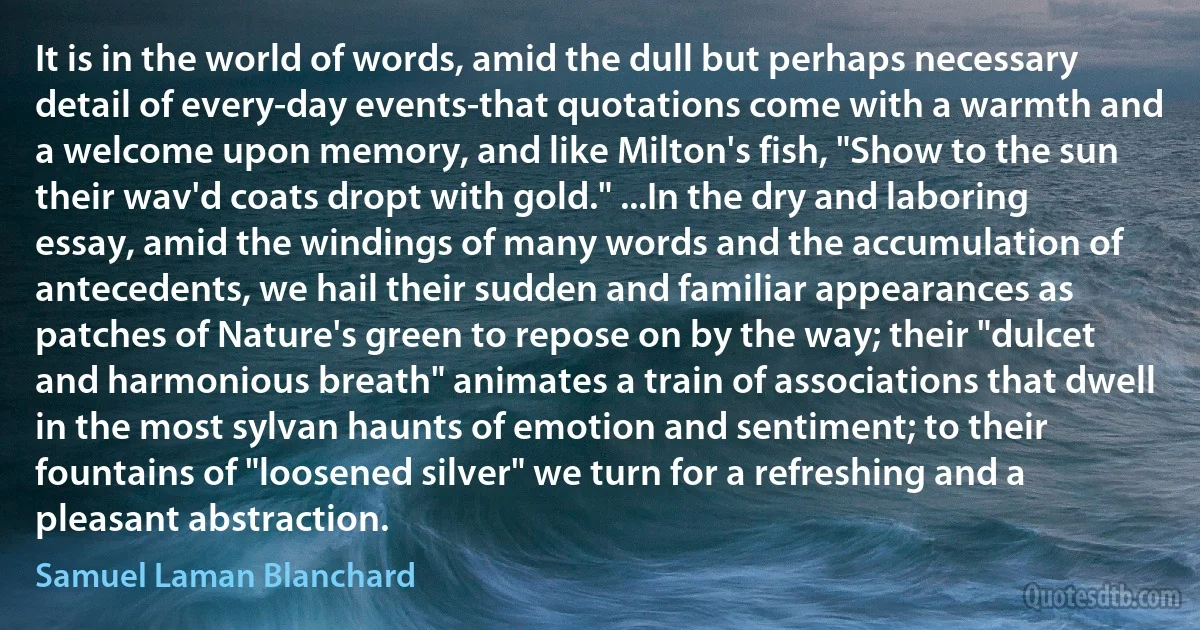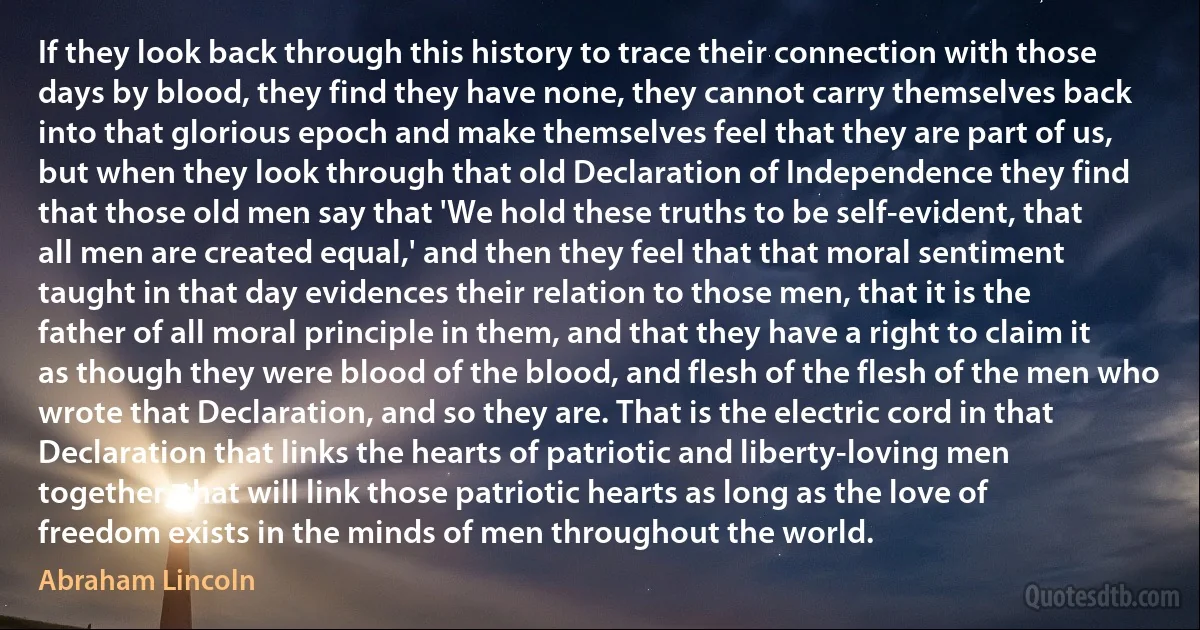Sentiment Quotes - page 15
In the character of the victim [Lincoln], and even in the accessories of his last moments, there is something so homely and innocent that it takes the question, as it were, out of all the pomp of history and the ceremonial of diplomacy-it touches the heart of nations and appeals to the domestic sentiment of mankind.

Benjamin Disraeli
Any time something is written against me, I not only share the sentiment but feel I could do the job far better myself. Perhaps I should advise would-be enemies to send me their grievances beforehand, with full assurance that they will receive my every aid and support. I have even secretly longed to write, under a pen name, a merciless tirade against myself.

Jorge Luis Borges
It is mere illusion and pretty sentiment to expect much from mankind if he forgets how to make war. And yet no means are known which call so much into action as a great war, that rough energy born of the camp, that deep impersonality born of hatred, that conscience born of murder and cold-bloodedness, that fervor born of effort of the annihilation of the enemy, that proud indifference to loss, to one's own existence, to that of one's fellows, to that earthquake-like soul-shaking that a people needs when it is losing its vitality.[specific citation needed].

Friedrich Nietzsche
It is essential that Christians understand this: Every Jew - secular, religious, assimilated, left-wing, right-wing - fears being killed because he is Jewish. This is the best-kept secret about Jews, who are widely perceived as inordinately secure and powerful. But it is the only universally held sentiment among Jews.

Dennis Prager
One may be astonished and even scandalized at the frequency, in religious climates, of more or less unintelligent opinions and attitudes, let it be said without euphemism; the indirect cause of this phenomenon is that religion, the goal of which is to save the largest possible number of souls and not to satisfy the need for causal explanations of an intellectual elite, has no motive for directly addressing the intelligence as such. In keeping with its end and with the capacity of the majority, the religious message is basically addressed to intuition, sentiment, and imagination, and then to the will, and to reason to the extent that the human condition requires it; it informs men of the reality of God, of the immortality of the soul and of their ensuing consequences for man, and it offers man the means of saving himself. It is not, does not wish to be, and cannot be, or offer, anything else, at least not explicitly; for implicitly it offers everything.

Frithjof Schuon
[Lloyd George] said they [the British] would have to make up their minds whether they were going to give the Indians what they wanted, or handle the situation. The trouble was that, although the Englishman talked about handling things, when the Government tackled the question the nation got up in arms about the methods, which would have to be like the Black and Tans in Ireland. In that case anyone could come along and shoot a defenceless officer in bed, or his wife, but immediately the assassin was hounded out there was a hue and cry from some of our own people. There was a curious sentiment in the English.

David Lloyd George
The consolations of the moral ideal are vigorous. They do not encourage idle sentiment. They recommend to the sufferer action. Our loss, indeed, will always remain loss, and no preaching or teaching can ever make it otherwise. But the question is whether it shall weaken and embitter, or strengthen and purify us, and lead us to raise to the dead we mourn a monument in our lives that shall be better than any pillared chapel or storied marble tomb. The criterion of all right relations whatsoever is that we are helped by them. And so, too, the criterion of right relations to the dead is that we are helped, not weakened and disabled, by them.

Felix Adler
"No human laws are of any validity if contrary to the law of nature; and such of them as are valid derive all their force and all their authority mediately or immediately from this original.” Thus writes Blackstone, to whom let all honour be given for having so far outseen the ideas of his time; and, indeed, we may say of our time. A good antidote, this, for those political superstitions which so widely prevail. A good check upon that sentiment of power-worship which still misleads us by magnifying the prerogatives of constitutional governments as it once did those of monarchs. Let men learn that a legislature is not "our God upon earth,” though, by the authority they ascribe to it, and the things they expect from it, they would seem to think it is. Let them learn rather that it is an institution serving a purely temporary purpose, whose power, when not stolen, is at the best borrowed.

Herbert Spencer
Nature is for art the garb of the Eternal. The real is the finite expression and representation of the true ; forms are the limits affixed by time and space to the power of life. Nature, reality, and form, should, all of them, be so rendered and expressed by art, as to reveal to mankind some ray of the truth - a vaster and profounder sentiment of life.

Giuseppe Mazzini
If you complain of neglect of Education in sons, what shall I say with regard to daughters, who every day experience the want of it? With regard to the Education of my own children, I find myself soon out of my depth, destitute and deficient in every part of Education.
I most sincerely wish that some more liberal plan might be laid and executed for the Benefit of the rising Generation, and that our new Constitution may be distinguished for encouraging Learning and Virtue. If we mean to have Heroes, Statesmen and Philosophers, we should have learned women. The world perhaps would laugh at me and accuse me of vanity, But you I know have a mind too enlarged and liberal to disregard the Sentiment. If much depends as is allowed upon the early education of youth and the first principles which are instill'd take the deepest root, great benefit must arise from literary accomplishments in women.

Abigail Adams
All of which goes to show that the State represents all the autocratic, arbitrary, coercive, belligerent forces within a social group, it is a sort of complexus of everything most distasteful to the modern free creative spirit, the feeling for life, liberty, and the pursuit of happiness. War is the health of the State. Only when the State is at war does the modern society function with that unity of sentiment, simple uncritical patriotic devotion, cooperation of services, which have always been the ideal of the State lover. ... How unregenerate the ancient State may be...is indicated by the laws against sedition, and by the Government's unreformed attitude on foreign policy.

Randolph Bourne
The sentiment that dominates all Rousseau's works is a certain plebeian anger that excites him against every kind of superiority. The energetic submission of the wise man bends nobly under the indispensable empire of social distinctions, and never does be appear greater than when he bows; but Rousseau has nothing at all of this loftiness. Weak and surly, he spent his life spouting insults to the great, as he would have offered the same to the people if he had been born a great lord.

Joseph de Maistre
The cultural competition of the early Cold War years was asymmetrical. Among European cultural elites there was still a widespread sentiment that they shared, across ideological divides and even bridging the Iron Curtain, a common culture to which America posed a threat. The French in particular took this line, echoing the early post-war efforts of their diplomats to trace an international policy independent of American control.

Tony Judt
Hal, who's empty but not dumb, theorizes privately that what passes for hip cynical transcendence of sentiment is really some kind of fear of being really human, since to be really human (at least as he conceptualizes it) is probably to be unavoidably sentimental and naïve and goo-prone and generally pathetic, is to be in some sort of basic interior way forever infantile, some sort of not-quite-right-looking infant dragging itself anclitically around the map, with big wet eyes and froggy-soft skin, huge skull, goey drool. One of the really American things about Hal, probably, is the way he despises what it is he's really lonely for: this hideous internal self, incontinent of sentiment and need, that pules and writhes just under the hip empty mask, anhedonia.

David Foster Wallace



